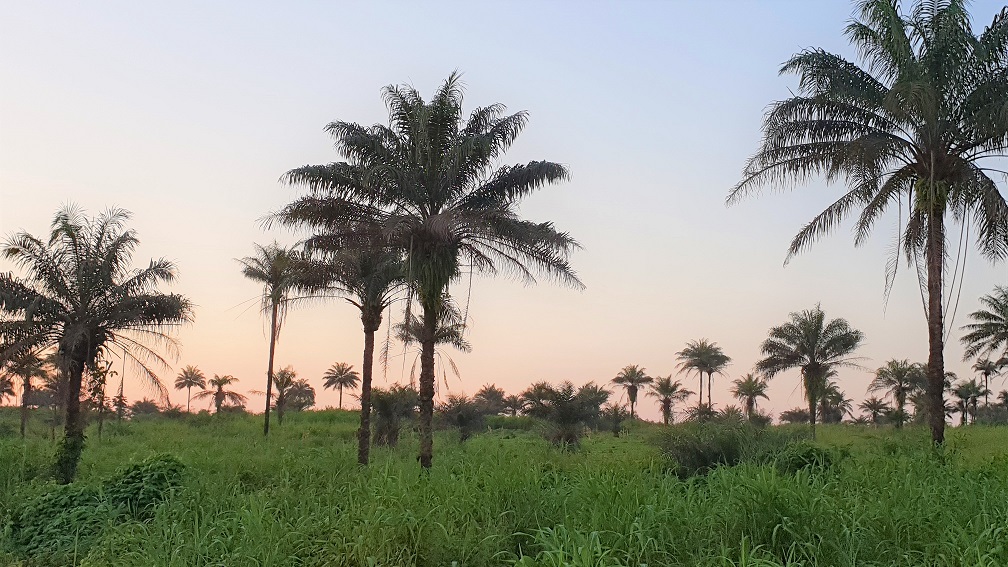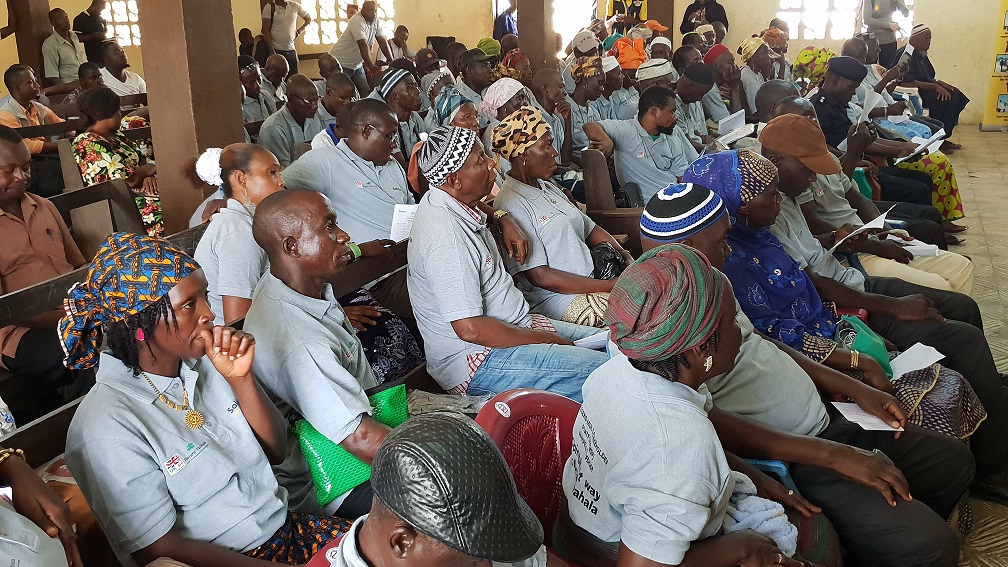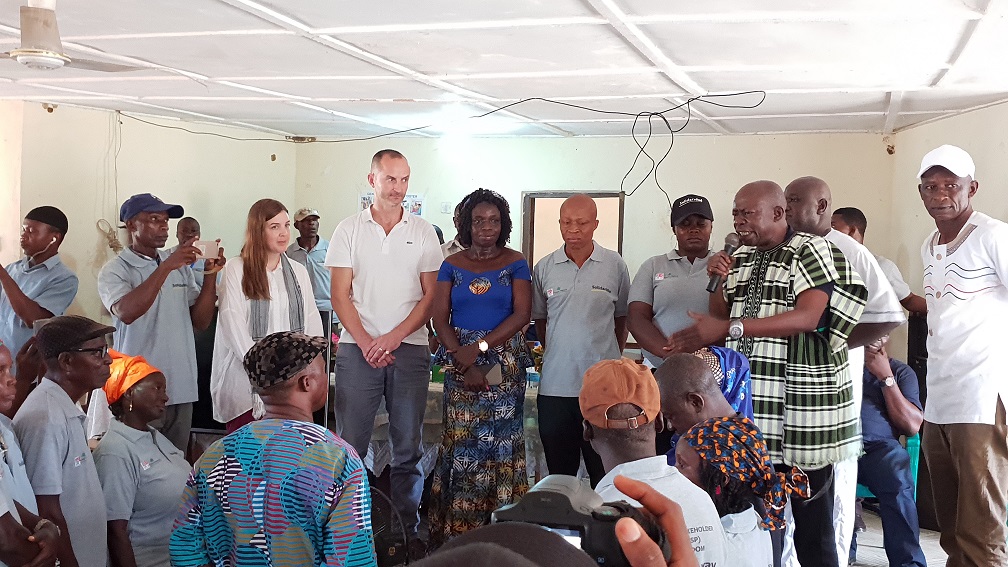
A typical landscape in Sierra Leone
Even though large-scale agricultural investments in commodity production can promote rural economic development, it also has the potential to undermine land rights, deprive local livelihoods and engender conflict. In 2015, the Sierra Leone National Land Policy was promulgated. The aspiration of the citizens was to move towards a clearer, more effective and just land tenure system. The Policy provides for social and public demands, stimulates responsible investment and promotes the nation’s continued development.
The policy was inspired by the Voluntary Guidelines for Responsible Governance of Tenure of Land, Forest and Fisheries (VGGT) promoted by the UN Food and Agriculture Organization and the Committee of World Food Security. The VGGT guides responsible and inclusive land-based private sector land investments in a way that respects and protects the rights, livelihoods and food security of people.
Collaborating with Natural Habitats in Zimmi
Having inherited a long-term agricultural lease in 2014, covering the entire Makpele Chiefdom (30,700 hectares) in Pujehun District, Natural Habitats Sierra Leone Limited had the ambition to realise a green field oil-palm plantation whilst complying with the highest possible standards through the Round Table for Responsible Palm Oil (RSPO) as well as organic certification.
But the land acquisition was not without a contest from stakeholders within the Makpele Chiefdom. On the one hand, the Makpele Land Owners and Users Association (MAKLOUA) opposed the lease agreement, citing lack of Free, Prior and Informed Consent (FPIC), sidelining some family members and depriving the people land to improve their livelihood. The Makpele Individual Landowners Association (MILA), on the other hand, were in favor of the lease arrangement. Meanwhile, the new National Land Policy (2015) caps large-scale concessions at 5,000 hectares per company.
Solidaridad has been collaborating with the Natural Habitats to ensure that the company’s investment in large-scale oil-palm production is responsible, sustainable, inclusive, transparent and recognized as such by all stakeholders. The United Kingdom’s Department for International Development (DFID) funds this intervention, which started in October 2016. The intervention was dubbed, Land: Enhancing Governance for Economic Development (LEGEND). The project focuses on mobilizing knowledge and capacity to improve land governance as an essential and inclusive basis for economic development. Its main goal is to apply and test the VGGT on the large-scale oil-palm plantation by Natural Habitats Sierra Leone Limited in Zimmi, a town located in the southern part of Sierra Leone, under the Pujehun District and part of the Makpele Chiefdom.

Participants of the multi-stakeholder process
A multi-stakeholder process to address land issues
"Opin tꓛk, rayt way fꓛ sꓛlve land wahala", is a vernacular slogan adopted for a multi-stakeholder platform that Solidaridad facilitated to address disagreements over land in Zimmi. The slogan literally means, ‘Open talk is the right way to solve land problems’. Guided by this maxim, Solidaridad works with Natural Habitats Sierra Leone Limited in collaboration with the Food and Agriculture Organization in Sierra Leone and non-governmental organizations including NAMATI, WOFHRAD and Green Scenery to provide space for ‘open talk’. Namati, a paralegal organization, provides additional support to local communities by providing legal education and free legal aid on land issues.
The multi-stakeholder platform consists of state actors from the Provincial level, District level, CSOs, Traditional authorities, land owners, land users, women groups, youths and representative from the office of National Security. Dialogue on the platform has been a key factor in maintaining a healthy relationship between Natural Habitats, local stakeholders and local authorities. The multi-stakeholder platform has proven instrumental in resolving disagreement over land, promoted transparency and inclusivity and fostered peace.
Historic announcement by Natural Habitat
Following months of engagement on the multi-stakeholder platform, Natural Habitat Sierra Leone Limited announced that it has ceded more than 27,398 hectares out of the original lease concession of 30,700 hectares to the Makpele Chiefdom.
“It was always our intention to give back part of the land to the people once we recognized that some stakeholders were not happy with the inherited lease agreement,” said Monique van Wijnbergen, corporate affairs manager of Natural Habitats. “We are glad that Solidaridad’s role as a neutral facilitator had promoted this dialogue, cleared doubts and brought out what was on people’s mind. Indeed, we are proud to have achieved this outcome together,” she said.

Government minister (holding microphone) serves as a witness for the brokered peace between MAKLOUA,MILA and Natural Habitats.
Peace at last
The multi-stakeholder process has not only witnessed the concession by the Natural Habitats Sierra Leone but also facilitated peace between the MAKLOUA and the MILA entities within the Makpele Chiefdom.
“We have always been against the lease arrangement because we believe it was not signed by legitimate people, it did not follow due process and it makes the people of the Makpele Chiefdom worse off. In fact, we have always insisted that it was a land grab,” said Alie Fofanah, chairman of MAKLOUA.
“Because of the disagreement over the lease agreement with Natural Habitats, there was always simmering tension between the MAKLOUA and MILA groups,” said Nicholas Jengre, country representative of Solidaridad in Sierra Leone. “Initially, it was difficult to get the two entities to sit and talk but now, through persistent engagement and support, the two have resolved their differences. The announcement by Natural Habitats Sierra Leone Limited signals peace at last,” he said.
This development has brought huge relief to the Paramount Chief of the Makpele Chiefdom who said the disagreement between MAKLOUA and MILA caused him great stress, as a leader of the people. “Today, there is joy in the chiefdom as Natural Habitats returns land to the people. It has brought peace among our people. We will have more land available for cultivation to meet our livelihood needs,” said Paramount Chief Saffa Tamu
The MILA group is disappointed over Natural Habitats’ decision to reduce the lease concession by more than 27,000 hectares because it means loss of ground rent to the association. Nonetheless, Haji Badara, public relations officer of MILA said the group is glad that finally there is peace between them and their kinsmen who opposed the lease arrangement. “We are grateful to Solidaridad for facilitating this process. Without their intervention, we would not have achieved this outcome at this time,” he said.
Besides the multi-stakeholde
r platform, the LEGEND project has also created community awareness; helped improve local livelihoods and provided extension services in the production of rice, cassava and groundnuts. More than 6,500 individuals across eight chiefdoms in three districts – Pujehun, Bo and Tonkolili – have so far benefitted from the project. The project is expected to end in June 2019.
Learn more about Solidaridad programmes in West Africa.
